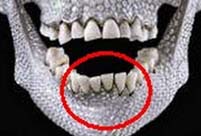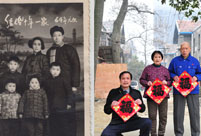 Deng Xiaoping: 'I have a clear conscience all my life'
Deng Xiaoping: 'I have a clear conscience all my life'
 Xi Jinping: 'The people are our strength'
Xi Jinping: 'The people are our strength'
 Amazing cliff diving in cold winter
Amazing cliff diving in cold winter
 Enjoy Sochi 2014 in slow motion
Enjoy Sochi 2014 in slow motion
 University student sentenced to death for poisoning roommate
University student sentenced to death for poisoning roommate
 Chinese lunar New Year celebrated in San Francisco
Chinese lunar New Year celebrated in San Francisco
 Taiwan Lantern Festival 2014
Taiwan Lantern Festival 2014
 Haiyang Yangge: make up
Haiyang Yangge: make up
 China's top 10 richest cities
China's top 10 richest cities
BEIJING, Feb. 26 -- Shares of Chinese automobile maker BYD soared on Wednesday on stock exchanges after its new energy sedans were granted access to the markets of Beijing and Shanghai.
It's good news for the Shenzhen-based auto giant, and also signals that the sector has started to break the local protectionism that has hindered its development for years.
BYD's shares listed on the Shenzhen stock exchange surged soon after market opening on Wednesday, and finished at 53.42 yuan (8.73 U.S. dollars) per share, hitting the 10-percent ceiling set by Chinese regulators.
The rise happened against the cross-boarder lackluster performance on the two bourses and was attributed to the latest breakthrough of the carmaker in squeezing its environmentally friendly models into Beijing and Shanghai's new energy vehicle market.
On Wednesday, Beijing's Municipal Commission of Economy and Information Technology released a list of companies and products covered by a government program to encourage the use of new energy cars.
BYD's pure electric E6 appeared on the list, together with a model manufactured by BAIC Motor, a Beijing-based firm.
Shanghai's municipal government on Tuesday included Qin, a plug-in electric car model made by BYD, on its list for promoting new energy car use, according to a statement.
The Qin model sells at a market price of around 160,000 yuan, and each buyer will receive a central government subsidy of 33,250 yuan, according to the statement.
China's new energy vehicle sector has gathered steam, boosted by strong government supports and increasing public awareness on environmental protection.
Earlier this month, the Chinese government announced the renewal of the favorable policies for the sector including financial aids and a broader promotion program in an effort to save energy and cut emissions.
On that backdrop, BYD's newly gained market access is worthy of note as it was won amid prevalent local protectionism among China's provincial new energy sedan market.
China's central government has provided hefty subsidies to drive sales by new energy car makers and initiated a pilot program to promote the cars in 40 cities and regions, the local governments of which have the right to determine which cars enjoy the subsidies and related favorable policies.
Consequently, local authorities have commonly been partial to local car makers that contribute to local tax revenue and economic growth, triggering difficulties for manufacturers from other provinces to enter the regional market.
Jia Xinguang, a seasoned auto analyst, bashed that practice, which has restrained the development of China's new energy vehicles, and called for a unified market with free access to all car makers.
Previously, BYD's electric and hybrid models had only entered the markets of Shenzhen and Tianjin cities, and Shaanxi and Hunan provinces. The company's senior managers had to visit city by city to persuade local authorities to add its models into the list.
The sector will only be ready for boom times if the local protective policies are eliminated, Jia said.
 Chinese Dream: the Chinese Spirit and the Chinese Way
Chinese Dream: the Chinese Spirit and the Chinese Way 51 bronze sacrificial utensils unearthed in Shaanxi
51 bronze sacrificial utensils unearthed in Shaanxi Most gorgeous female celebs in Chi-pao
Most gorgeous female celebs in Chi-pao Second round of test kicks off at Beijing Film Academy
Second round of test kicks off at Beijing Film Academy Ancient Qiang people had vertically grown teeth
Ancient Qiang people had vertically grown teeth Top 10 Chinese youth’s favorite seaside destinations
Top 10 Chinese youth’s favorite seaside destinations Traditional Tibetan clothing tailors
Traditional Tibetan clothing tailors In photos: Unveiling Taishan station
In photos: Unveiling Taishan station Beautiful moments of family reunion
Beautiful moments of family reunion Chinese warplanes C919 to appear at Singapore Airshow
Chinese warplanes C919 to appear at Singapore Airshow Ruins of Shang Dynasty's structure unearthed in Shaanxi
Ruins of Shang Dynasty's structure unearthed in Shaanxi  Intercity high speed train in operation
Intercity high speed train in operation Severe coldness freezes large parts of China
Severe coldness freezes large parts of China  Beautiful moments of Sochi
Beautiful moments of Sochi  It's not just performing this year
It's not just performing this yearDay|Week|Month